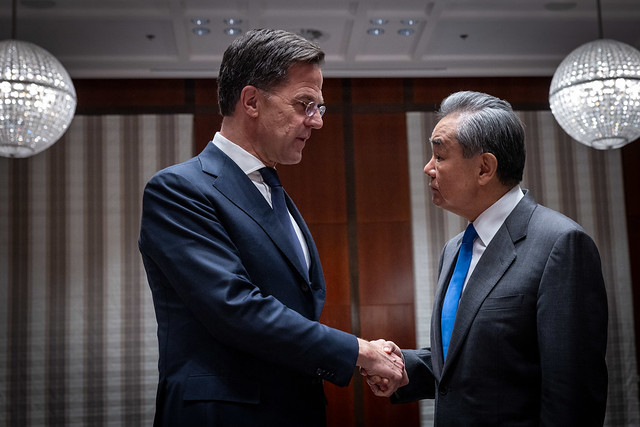风萧萧_Frank
以文会友唐纳德·特朗普的强势外交政策为中国带来机遇
作者:马修·莱维特,2025年3月7日
https://www.americansecurityproject.org/donald-trumps-aggressive-foreign-policy-presents-an-opportunity-for-china/
唐纳德·特朗普的强势外交政策为中国带来机遇 北约秘书长马克·吕特与中国外交部长王毅在慕尼黑安全会议上合影。北约
特朗普第二届政府在外交政策上的大刀阔斧的改革,迄今为止已疏远了其欧洲盟友,瓦解了美国国际开发署这一美国软实力的主要来源,并恶化了与美国在拉丁美洲最强大的盟友之一哥伦比亚的关系。唐纳德·特朗普的“铁腕”外交政策正在动摇世界秩序,但美国外交政策的这种鲜明对比并没有像他所预测的那样,对世界各国领导人产生影响。相反,它导致美国在安全和经济领域陷入孤立,并鼓励中国加强与美国盟友的关系。
特朗普的“美国优先”外交政策方针,虽然对美国的盟友和伙伴来说并不新鲜,但其带有新的攻击性,使他们对与美国关系的未来产生了疑问。友好国家正在重新考虑与美国的外交、安全和经济联系,而中国正利用这种混乱局面推进与这些国家的关系。随着美国完成解散美国国际开发署并停止数百亿美元用于支持人道主义项目的对外援助,中国继续在发达国家和发展中国家投资数千亿美元,构建其势力范围。
副总统J.D.万斯在慕尼黑会议上对欧洲盟友的批评,恰逢美国和俄罗斯就恢复外交关系正常化和结束乌克兰战争展开新的谈判——尽管没有乌克兰或欧洲官员参与其中。针对万斯的言论和利雅得会晤,即将上任的德国新总理弗里德里希·梅尔茨表达了“脱离美国独立”的愿望。自利雅得会晤以来,特朗普因与泽连斯基在椭圆形办公室的争吵而停止了对乌克兰的所有援助,这促使欧洲领导人努力达成一项不包括美国的和平协议和安全领域。就连欧洲各地的民粹主义保守派领导人也开始与特朗普划清界限。
尽管特朗普政府违背了欧洲盟友的意愿,但中国外交部长王毅却站在他们一边,支持“欧洲在和平谈判中发挥重要作用”。随着美国与其北约盟友之间的紧张关系加剧,欧洲人应该在进一步内部化国防工业之前,考虑一下他们能够容忍多少美国的好战行为。2022年中期至2023年中期,欧盟国家63%的军事采购支出流向了美国国防公司,但现在,欧盟……制定了一项紧急国防支出计划,这将大幅增加欧洲的国防开支,如果其国防采购和生产能力增强,可能会进一步内化。如果美国维持目前在欧洲的立场,不仅会损害其在世界舞台上的地位和吸引合作的能力,还会发现自己脱离了几十年来发展和维持的安全圈。
除了华盛顿新的外交策略外,美国的经济政策也未能说服世界各国领导人将美国视为可靠的盟友。由于过去十年美国历届政府的外交和经济政策发生了剧烈变化,欧洲国家正在重新评估这种大规模合作带来的风险。特朗普提出对一系列欧洲商品征收25%的关税,欧盟已宣布将“坚决且立即作出反应”。如今,欧洲与中国的关系开始解冻,因为在美国关税的持续威胁下,中国目前是更可预测的贸易伙伴。
但特朗普政府搅动的不仅仅是欧洲的国际关系。特朗普第二任期内首件引人注目的外交政策事件是,哥伦比亚总统古斯塔沃·佩特罗以“缺乏人类尊严”为由拒绝接受一架载有被驱逐移民的军用货机,导致所有哥伦比亚商品被征收25%的关税。尽管佩特罗最终迫于压力作出让步,但这一事件向美国盟友传递了特朗普强硬外交政策死灰复燃的信号。自此以后,哥伦比亚——2023年美国对外援助第14大接受国,也是华盛顿在拉丁美洲历史上最强大的盟友之一——加速了其长达数月的经济脱钩进程。目前,哥伦比亚正在敲定加入中国“一带一路”倡议的计划,同时也在寻求加入金砖国家,并可能与中国达成自由贸易协定。
如果美国继续推行这种敌对外交政策,它将我失去盟友的速度比留住或吸引盟友的速度要快。虽然在巴拿马等个别情况下,这种策略可能有效,但不应成为标准。在一个日益多极化的世界里,盟友是最重要的资产,中国乐于与美国盟友发展伙伴关系,而不必像唐纳德·特朗普那样公开谴责。
Donald Trump’s Aggressive Foreign Policy Presents an Opportunity for China
 NATO Secretary General Mark Rutte with the Minister of Foreign Affairs of China, Wang Yi, at the Munich Security Conference. NATO
NATO Secretary General Mark Rutte with the Minister of Foreign Affairs of China, Wang Yi, at the Munich Security Conference. NATOThe second Trump administration’s drastic change in foreign policy has, so far, alienated its European allies, dismantled a major source of American soft power in USAID, and soured relations with Colombia, one of the U.S.’ strongest allies in Latin America. Donald Trump’s “iron-fist” approach to foreign policy is shaking the world order, but this stark contrast in U.S. foreign policy is not whipping world leaders into shape as he predicted. Instead, it is ushering in U.S. isolation in security and economic spheres, and encouraging greater Chinese relations with U.S. allies.
Trump’s “America First” approach to foreign policy, while not new to U.S. allies and partners, comes with a renewed aggressiveness that leaves them questioning the future of their relationship with the United States. Friendly nations are now reconsidering their diplomatic, security, and economic coupling with the United States, and China is taking advantage of the chaos to advance relations with them. As the U.S. completes the dissolution of USAID and the cessation of tens of billions of dollars of foreign aid supporting humanitarian programs, China continues investing hundreds of billions of dollars across the developed and the developing world, building its sphere of influence.
Vice President JD Vance’s criticisms of European allies in Munich coincided with new negotiations between the United States and Russia about the re-normalization of diplomatic relations and ending the war in Ukraine—though no Ukrainian or European officials were involved. In response to Vance’s comments and the Riyadh meeting, new expected German Chancellor, Friedrich Merz, expressed his desire to “achieve independence from the U.S.” Since Riyadh, Trump has ceased all aid to Ukraine in response to his argument with Zelenskyy in the Oval Office, prompting European leaders to work towards a peace deal and security sphere that does not include the United States. Even populist conservative leaders across Europe are distancing themselves from Trump.
While the Trump administration defied the wishes of its European allies, Chinese Foreign Minister Wang Yi sided with them, supporting “Europe’s important role in the peace talks.” As tensions between the United States and its NATO allies rise, the Europeans should consider how much American belligerence they can tolerate before greater internalizing their defense industry. Between mid-2022 and mid-2023, 63% of E.U. countries’ military procurement spending went to U.S. defense companies, but now, the E.U. has laid out an emergency defense spending plan that will significantly boost European defense spending and likely internalize more if its defense procurement and production. If the United States maintains its current stance in Europe, it will not only hurt its position on the world stage and its ability to attract cooperation, but it will also find itself outside of a sphere of security it has grown and maintained for decades.
In addition to Washington’s new diplomatic approach, American economic policy is not convincing world leaders to see the United States as a reliable ally. Due to drastic shifts in U.S. foreign and economic policy across administrations this past decade, European nations are reevaluating the risks associated with such significant coupling. Trump floated imposing 25 percent tariffs on an assortment of European goods, to which the E.U. has announced it would “react firmly and immediately.” Now, Europe has begun thawing relations with China, because under constant threats of U.S. tariffs, China is currently the more predictable trading partner.
But the Trump administration has not just stirred international relations in Europe. The first headline foreign policy event of Trump’s second term saw 25 percent tariffs on all Colombian goods due to President Gustavo Petro’s refusal to accept a military cargo plane of deported immigrants on the grounds it lacked human “dignity”. While Petro ultimately backed down due to pressure, the incident sent the message of Trump’s revived strongarm foreign policy to American allies. Since then, Colombia, the 14th largest recipient of U.S. foreign aid in 2023 and one of Washington’s strongest historical allies in Latin America, has accelerated its months-long process of economic decoupling from the United States. Now, Colombia is finalizing plans to join China’s Belt and Road Initiative while also seeking to join BRICS and potentially enter a free-trade agreement with China.
If the United States keeps pushing this hostile foreign policy, it will lose allies quicker than it can retain or attract them. While it may prove effective in isolated cases, such as Panama, this strategy should not become the standard. In an increasingly multipolar world where allies are the greatest asset, China is glad to develop partnerships with U.S. allies that do not involve the public admonishment that comes with Donald Trump.




